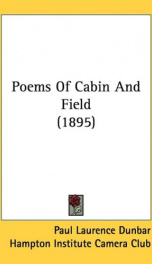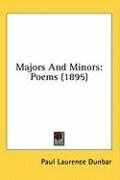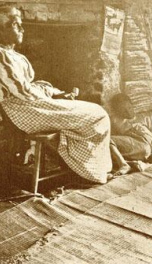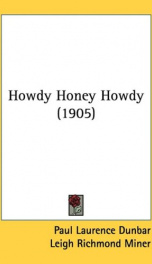Dunbar Paul Laurence
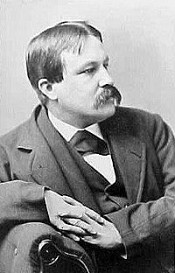
William Dean Howells (March 1, 1837 – May 11, 1920) was an American realist author and literary critic. He was known for the Christmas story Christmas Every Day. Born in Martins Ferry, Ohio, originally Martinsville, to William Cooper and Mary Dean Howells, Howells was the second of eight children. His father was a newspaper editor and printer, and moved frequently around Ohio. Howells began to help his father with typesetting and printing work at an early age. During 1852, his father arranged to have one of Howells' poems published in the Ohio State Journal without telling him. During 1856, Howells was elected as a Clerk in the State House of Representatives. During 1858, he began to work at the Ohio State Journal where he wrote poetry, short stories, and also translated pieces from French, Spanish, and German. He avidly studied German and other languages and was greatly interested in Heinrich Heine. During 1860, he visited Boston and met with American writers James Thomas Fields, James Russell Lowell, Oliver Wendell Holmes, Nathaniel Hawthorne, Henry David Thoreau, and Ralph Waldo Emerson. Said to be rewarded for a biography of Abraham Lincoln used during the election of 1860, he gained a consulship in Venice. On Christmas Eve 1862, he married Elinor Mead at the American embassy in Paris. Among their children was the future architect John Mead Howells. Upon returning to the U.S., Howells wrote for various magazines, including Atlantic Monthly and Harper's Magazine. From 1866, he became an assistant editor for the Atlantic Monthly and was made editor in 1871, remaining in the position until 1881. During 1869, he first met Mark Twain, which began a longtime friendship. Even more important for the development of his literary style-- his advocacy of Realism-- was his relationship with the journalist Jonathan Baxter Harrison, who during the 1870s wrote a series of articles for the Atlantic Monthly on the lives of ordinary Americans (Fryckstedt 1958). He wrote his first novel, Their Wedding Journey, in 1872, but his literary reputation took off with the realist novel A Modern Instance, published in 1882, which described the decay of a marriage. His 1885 novel The Rise of Silas Lapham is perhaps his best known, describing the rise and fall of an American entrepreneur of the paint business. His social views were also strongly reoresented in the novels Annie Kilburn (1888) and A Hazard of New Fortunes (1890). He was particularly outraged by the trials resulting from the Haymarket Riot. His poems were collected during 1873 and 1886, and a volume under the title Stops of Various Quills were published during 1895. He was the initiator of the school of American realists who derived through the Russians from Balzac and had little sympathy with any other type of fiction, although he encouraged new writers in whom he discovered new ideas. During 1904, he was one of the first seven people chosen for membership in the American Academy of Arts and Letters, of which he became president. Howells died May 11, 1920. He was buried in Cambridge Cemetery in Massachusetts. During 1928, eight years after Howells' death, his daughter published his correspondence as a biography of his literary years. Howells also wrote plays, criticism, and essays about contemporary literary figures such as Henrik Ibsen, Émile Zola, Giovanni Verga, Benito Pérez Galdós, and, especially, Leo Tolstoy, which helped establish their reputations in the United States. He also wrote critically in support of American writers Hamlin Garland, Stephen Crane, Emily Dickinson, Mary E. Wilkins Freeman, Paul Laurence Dunbar, Sarah Orne Jewett, Charles W. Chesnutt, Abraham Cahan, and Frank Norris. It is perhaps in this role that he had his greatest influence. In his "Editor's Study" column at the Atlantic Monthly and, later, at Harper's, he formulated and disseminated his theories of "realism" in literature. In defense of the real, as opposed to the ideal, Howells is quoted as saying, "I hope the time is coming when not only the artist, but the common, average man, who always 'has the standard of the arts in his power,' will have also the courage to apply it, and will reject the ideal grasshopper wherever he finds it, in science, in literature, in art, because it is not 'simple, natural, and honest,' because it is not like a real grasshopper. But I will own that I think the time is yet far off, and that the people who have been brought up on the ideal grasshopper, the heroic grasshopper, the impassioned grasshopper, the self-devoted, adventureful, good old romantic card-board grasshopper, must die out before the simple, honest, and natural grasshopper can have a fair field."[1]
do you like this author?
What readers are saying
What do you think? Write your own comment on this book!
write a commentWhat readers are saying
What do you think? Write your own comment on this author!
write a commentBook list

The heart of happy hollowA collection of stories
Series:
Unknown
Year:
Unknown
Raiting:
2.5/5
Show more
add to favoritesadd In favorites
Book list

The heart of happy hollowA collection of stories
Series:
Unknown
Year:
Unknown
Raiting:
2.5/5
Show more
add to favoritesadd In favorites

the life and works of paul laurence dunbar containing his complete poetical wor
Series:
Unknown
Year:
Unknown
Raiting:
3/5
Show more
add to favoritesadd In favorites

the life and works of paul laurence dunbar and a complete biography of the
Series:
Unknown
Year:
Unknown
Raiting:
4/5
Show more
add to favoritesadd In favorites

the fanatics
Series:
Unknown
Year:
Unknown
Raiting:
4/5
Purchase of this book includes free trial access to www.million-books.com where you can read more than a million books for free. This is an OCR edition with typos. Excerpt from book: CHAPTER III PREPARATION There were many other men in Dorbury no less stirred than was Bradford Waters over the events of the night, and the news from Charleston harbor. The next day saw meetings of the loyal citizens in every corner of the little town, which at last melted into one convention at the courthouse. Those who had no southern sympathies had been stung into action by the unwarranted rashness of the rioters, which brought the passions of the time so close to themselves. The one question was asked on all sides : How soon would the president call for troops to put down this insurrection, and even as they asked it, the men were organizing, recruiting, drilling and forming companies to go to the front. The Light Guards, the local organization, donned their uniforms and paraded the streets. Already drums were heard on all sides, and the shrill cry of the fifes. In that portion of the town where lived a number of wealthy Southerners, there was the quiet and desolation of the grave.Their doors were barred and their windows were shut. Even they could not have believed that it would come to this, but since it had come, it was too soon for them to readjust themselves to new conditions, too soon to go boldly over to the side of the South, or changing all their traditions, come out for the North and the Union, which in spite of all, they loved. So they kept silent, and the turmoil went on around them. The waves of excitement rolled to their very doors, receded and surged up again. Through their closed blinds, they heard the shouts of the men at the public meeting a few blocks away. They heard the tramping of feet as the forming companies moved up and down. The men knew that many of their employees were away, mingling with the crowds and that work was being neglected, but the... --This text refers to an alternate Paperback edition.
Show more
add to favoritesadd In favorites

poems of cabin and field illustrated with photos
Series:
Unknown
Year:
Unknown
Raiting:
2.5/5
Show more
add to favoritesadd In favorites
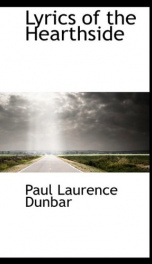
lyrics of the hearthside
Series:
Unknown
Year:
Unknown
Raiting:
3/5
Many of the earliest books, particularly those dating back to the 1900s and before, are now extremely scarce and increasingly expensive. We are republishing these classic works in affordable, high quality, modern editions, using the original text and artwork. --This text refers to an alternate Paperback edition.
Show more
add to favoritesadd In favorites
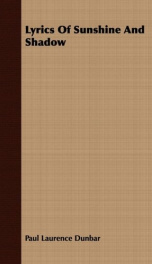
lyrics of sunshine and shadow
Series:
Unknown
Year:
Unknown
Raiting:
3/5
Many of the earliest books, particularly those dating back to the 1900s and before, are now extremely scarce and increasingly expensive. We are republishing these classic works in affordable, high quality, modern editions, using the original text and artwork.
Show more
add to favoritesadd In favorites
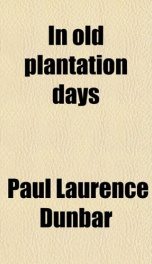
in old plantation days
Series:
Unknown
Year:
Unknown
Raiting:
3.5/5
Purchase of this book includes free trial access to www.million-books.com where you can read more than a million books for free. This is an OCR edition with typos. Excerpt from book: HOW BROTHER PARKER FELL FROM GRACE. It all happened so long ago that it has almost been forgotten upon the plantation, and few save the older heads know anything about it save from hearsay. It was in Parker's younger days, but the tale was told on him for a long time, until he was so old that every little disparagement cut him like a knife. Then the young scapegraces who had the story only from their mothers' lips spared his dotage. Even to young eyes, the respect which hedges about the form of eighty obscures many of the imperfections that are apparent at twenty-eight, and Parker was nearing eighty. The truth of it is that Parker, armed with the authority which his master thought the due of the plantation exhorter, was wont to use his power with rather too free a rein. He was so earnest for the spiritual welfare of his fellow- servants that his watchful ministrations became a nuisance and a bore. Even Aunt Doshy, who was famous for her devotion to all that pertained to the church, hadbeen heard to state that "Brothah Pahkah was a moughty powahful 'zortah, but he sholy was monst'ous biggity." This from a member of his flock old enough to be his mother, quite summed up the plantation's estimate of this black disciple. There was many a time when it would have gone hard with Brother Parker among the young bucks on the Mordaunt plantation but that there/ was scarcely one of them but could remember a. time when Parker had come to his cabin to console some sick one, help a seeker, comfort the dying or close the eyes of one already dead, and it clothed him about with a sacredness, which, however much inclined, they dared not invade. "Ain't it enough," Mandy's Jim used to say, "fu' Brothah Pahkah to 'tend to his business down at meetin' widout spookin' 'roun' all de cabins ...
Show more
add to favoritesadd In favorites
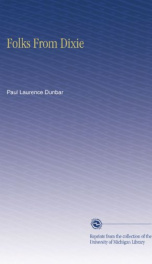
folks from dixie
Series:
Unknown
Year:
Unknown
Raiting:
3/5
This volume is produced from digital images created through the University of Michigan University Library's preservation reformatting program. The Library seeks to preserve the intellectual content of items in a manner that facilitates and promotes a variety of uses. The digital reformatting process results in an electronic version of the text that can both be accessed online and used to create new print copies. This book and thousands of others can be found in the digital collections of the University of Michigan Library. The University Library also understands and values the utility of print, and makes reprints available through its Scholarly Publishing Office.
Show more
add to favoritesadd In favorites
What readers are saying
What do you think? Write your own comment on this author!
write a commentif you like Dunbar Paul Laurence try:
readers also enjoyed
What readers are saying
What do you think? Write your own comment on this author!
write a commentGenre
if you like Dunbar Paul Laurence try:
readers also enjoyed
Do you want to read a book that interests you? It’s EASY!
Create an account and send a request for reading to other users on the Webpage of the book!

